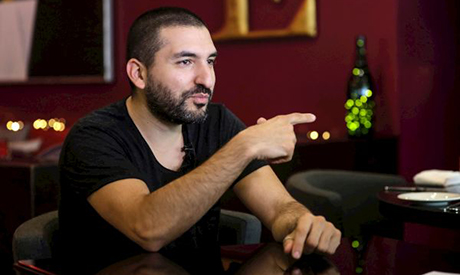
by AFP
For star trumpeter Ibrahim Maalouf, famed for his award-winning film soundtracks and jazz-inspired mixing of eastern and western sounds, improvisation is “a way of life”. “Improvisation is a discipline that people don’t understand well,” the Franco-Lebanese musician, who has played with Sting and Elvis Costello among others, told AFP. “For me it symbolises and sums up perfectly the best way to live, alongside each other,” he said during a trip to Lebanon to prepare for a July concert at a festival in Baalbek. “To succeed in communicating with each other we must listen to each other and have empathy with others, despite the differences.”
The 36-year-old, born in Lebanon, fled with his parents — both musicians — during the country’s 15-year-civil war and settled in France. He plays a four-pistoned instrument invented by his trumpeter father in the 1960s, as well playing the piano, composing and teaching.He won French cinema’s highest award, a Cesar, in February for the music to “In the Forests of Siberia”. He also wrote the score for Japanese director Naomi Kawase’s “Radiance” which was nominated for a Palme d’Or at this month’s Cannes film festival. Composition aside, Maalouf has a passion for the spontaneous. He is the artistic director of m’IMPROvise, a June festival in Etampes near Paris, with Quincy Jones’ protege, pianist Alfredo Rodriguez, topping the line-up. He has gathered hundreds of people for joint improvisations, including at the 2015 Fete de la Musique in Paris. “To improvise with others is to share a unique moment that will never happen twice,” he said. Nephew of leading Lebanese writer Amin Maalouf, a member of the Academie Francaise, the trumpeter says he does not try to make his music popular.
“I write music that awakens a feeling in me that makes me happy. I have the impression that people appreciate that,” he said. “From the moment I’m on stage my priority is not to party with my musicians, the most important thing for me is that the public understands my musical language.” “Before playing my music I address the audience and explain it to them. I want to be understood by people.” Despite his film music success, he doubts he could work in Hollywood. “In my way of working, there is a permanent search for creation and authenticity,” he said. “Hollywood is an industry that operates according to codes. It is very rare that a film goes outside the usual framework of the Hollywood film industry.” “If Steven Spielberg or Quentin Tarantino for example asked me to compose music for their films and told me what they want… I would be obliged to refuse,” he said. “I don’t know how to do that.”



